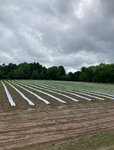

LUMBERLAND — The Executive Committee of the county Legislature approved the agricultural zone for a farm in Lumberland last Thursday, expanding the farm’s opportunities for industrialized hemp growth within Sullivan County.
The legislature approved 109 acres to be designated for Torrwood Farm. The farm has been family owned and run since 1846, however this is their second year in the hemp industry. Lucas Kerr, a seventh generation landowner at Torrwood, also runs a disabled veterans small business called VETRUN. His goal is to make hemp and CBD products that help veterans and civilians alike.
“The agricultural zone will change the farm as we will be able to make capital investments in things like discs, plows, and transplanters in order to grow more hemp,” said Kerr. “One of the projects we are going to tackle next year is making a combat gauze for wound packing that is made from hemp.”
But the road to industrial hemp farming and production was not easy. Since 1937, hemp was incorrectly associated with marijuana and banned throughout the United States. Wealthy businessmen such as Andrew Melon, William Randolph Hearst, and the Du Pont family sparked the prohibition.
While both hemp and marijuana are derived from the cannabis plant, hemp provides no psychoactive effects when ingested.
“Hemp is one of the most versatile plants in human history. It can be used in over 500 different products, from biodiesel, to plywood, to insulation for homes,” said David Holland.
Holland is an attorney specializing in cannabis advocacy and legalization. He brought the matter of hemp production to the floor of the county legislature prior to the agricultural zone’s approval. His advocacy demonstrated how industrialized hemp farming could be highly beneficial for Sullivan County.
“Hemp has a very small harvest time,” said Holland. “While it takes 80 years for a tree to grow to maturity to produce one piece of paper, it only takes hemp 90 days to reach full maturity and it can be harvested two to three times a year. Sullivan County has the opportunity to become a leader in paper production.”
For Kerr, this zoning goes far beyond hemp, as the upgraded equipment will open many other organic farming opportunities. Hemp is just one part of Torrwood Farm’s overall agricultural contribution in Sullivan County and these newly approved zones will allow the farm to take these steps quickly.
Yet, there still remains much opportunity for hemp production within Sullivan County. The proximity to New York City could facilitate an international trading system. The growth and production of hemp within the county would also lead the state closer to becoming carbon neutral, combating the increasing effects of climate change.
“By bringing industrialized hemp to Sullivan County we are staking a claim in a market that should never have been snuffed out in 1937,” said Kerr. “It is already employing many residents whilst rebuilding the older, neglected farming infrastructure that would not have the opportunity to be upgraded and repurposed. We are excited for the opportunity to be a part of the growing hemp industry, from medical products to construction products all while being the highest standard organic.”
Comments
No comments on this item Please log in to comment by clicking here